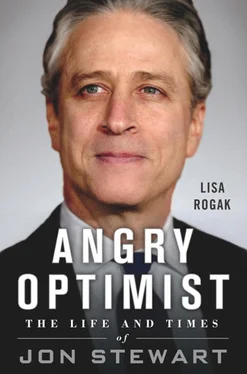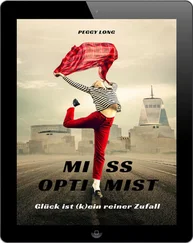While other comics with similar physical shortcomings may have woven an entire lifetime’s worth of routines around their imperfections, Stewart differentiated himself by steering away from it. Sure, he’ll allude to his height and ethnic background every so often, but it’s clear he finds it tedious to dwell on them. After all, his is a very specific type of comedy: no pratfalls, no physical pranks. Stewart’s brand of comedy emanates 100 percent from his brain.
And he’s certainly found the perfect forum sitting behind The Daily Show newsdesk. While he will occasionally rail against the iniquities of the world away from his Daily Show pulpit, for the most part he keeps a very low profile, and is extremely private and protective of his personal life. Though he will occasionally indulge the paparazzi and allow them to snap a few pictures of himself and his family, photographers know that to camp out on his doorstep in Tribeca would pretty much be a huge waste of time, because once Stewart enters the building after a long day at the studio, he doesn’t leave until it’s time to head uptown again the next day for the painstaking, pressure-cooker process of putting the next show together. You’ll rarely see him mentioned in the gossip columns or read about him partying at some glam black-tie gala.
“I have two speeds in my life,” he said, “pedaling a hundred miles per hour uphill to try and stay up, or sitting at home on my couch with a glazed doughnut on my lap staring at a Knicks game. I need downtime to refill the reservoir. I don’t have much of a life outside. It is all-consuming.
“I should probably make [my] story interesting, but I got nothing,” he said. “I’m trying to imagine Kitty Kelley in here saying, ‘Let’s do a book’ and she’d be in here for five minutes and then she’d say, ‘You know what? Screw this.’”
This biographer will tell you that yes, it’s been a challenge to research the man. Not only does Stewart keep a low profile whenever he’s not toiling away at the Daily Show studios, but his friends and colleagues are equally closemouthed about disclosing any quirks or stories about the man. But maybe that’s why his audience respects him so much, aside from the acerbic wit, the probing intelligence, and the eagerness to point out hypocrisy: because he’s not out claiming space in the tabloids or striving to increase his visibility or Klout Score, they trust him.
He doesn’t much care about fame, and indeed, he never set out with grandiose plans for recognition in mind.
“My goal was always to be better than I was at the present time,” he confessed.
Yet, despite this laissez-faire attitude, Stewart’s always had a backup plan. After all, ever since his father left the family when Jon was ten years old, he’s always felt like the rug was about to be yanked out from under him. In yet another exchange on Larry King’s talk show, Stewart expressed mild outrage that anyone would consider him as someone who looks on the sunny side of the street.
“I’m a Jew. What kind of question is that, are you an optimist? I always have my bags packed. Is that optimistic? I never know when they’re going to knock on my door and [tell me to leave]. There are very few countries that don’t have at least one museum going, ‘And this is when we chased you out.’ That’s why we’re all in comedy, we want to stay .”
But it’s that same philosophy that has lent a certain degree of flexibility to Stewart’s life. After all, while he worked his tail off for years to reach his current level of fame and stardom, his belief—warped though it may be—that it could all disappear tomorrow afforded him an outlook that was all too rare in an industry where many people automatically assumed they were destined to be stars. Of his early days in comedy, he said, “I had to make peace with the fact that if this works, great, and if it doesn’t, I had to be okay with that, too. You can’t go into it thinking, ‘If I do this and they take this away, what’s going to happen to me?’ You have to know that you can always open an ice-cream store.”
And while Stewart may jokingly dismiss any suggestion that he is an optimist at heart—he would never deny the fact that he is indeed at times a very angry man. Yet if he didn’t wholeheartedly believe that he could bring about real change for the better in the government, the world, even his own neighborhood, he would have no reason or motivation to work as hard as he has to attract attention to the issues that are near and dear to his heart.
And that is the definition of an optimist in any book.
“The idea that I get to do this for a living is mind-boggling to me,” he said. “It really is sort of a dream life.”
But that’s not how things started out.
WHEN JONATHAN STUART LEIBOWITZ was born on November 28, 1962, in New York City to Donald and Marian Leibowitz toward the end of the huge postwar baby boom, he began a typical middle-class American childhood that was unremarkable for the time, and apparently very much strived for by the majority of people in the United States.
He joined Larry, a brother who was two years older, and the Leibowitz family had little to set it apart from the other families living in Lawrenceville, New Jersey, just down the road from Princeton, in all ways but one. As one of only a handful of Jewish families who lived in the area around the famed Ivy League school—notorious as a well-heeled Protestant college that was rumored to deliberately limit the quota of Jewish students admitted well into the 1970s—the Leibowitzes were determined to live an everyday—and secular—American life in the peaceful heyday of the early 1960s. As Stewart later put it, he never lived anything but a typical American childhood: “I grew up in the good old days before kids had these damn computers and actually played outside.”
He watched popular TV shows like Emergency! and The Hudson Brothers Show, he ate Quisp cereal and collected box tops to redeem for cheap plastic toys, and developed the first crush of his life on Eve Plumb, who played Jan Brady on The Brady Bunch .
“My life was typical,” he said. “I played Little League baseball. I never wanted for food. I always had shoes. I had [my own] room. There were no great tragedies. There were the typical ups and downs, but I wouldn’t say it was at all sad. We were Jewish and living in the suburbs so there was a slightly neurotic bent to it, but I can’t point to anything where a boy overcame a tragedy to become a comedian. As my grandmother used to say, ‘I can’t complain.’”
Despite his apparently normal childhood, young Jon did stand out in one way: he was short. Noticeably so. His classmates towered above him, and so he made an easy target. And it didn’t take him long before he realized the best way to deflect his tormentors was with a witty comment or pointed retort.
“I was very little, so being funny helped me have big friends,” he said.
“I realized it was a way of getting attention pretty early on,” Jon added. “There was a sense that this feels good, to say something that made everybody laugh. It was a rhythm that made sense to me.”
Though the Leibowitzes belonged to a local synagogue and Jon attended a yeshiva kindergarten before moving on to first grade at the local public school, neither parent was particularly interested in immersing themselves wholeheartedly in the Jewish faith. Possibly this was because of a lack of opportunities to do so in and around Princeton, but also because they hoped to distance themselves from their family history and blend into the community more easily. Donald’s grandfather was ultra-Orthodox; he ran a shoe store on the Lower East Side of Manhattan and never failed to wear his religion on his sleeve. “When we visited his store, he would… make me recite prayers,” said Donald. His son—Donald’s father—had already begun the move away from a life of extreme religion by becoming a cabdriver in New York. At the time, running a store in an orthodox Jewish neighborhood pretty much ensured that few Gentiles would cross the threshold into the store; on the other hand, a cabdriver gave up control over the types of people he’d interact with over the course of a day.
Читать дальше












